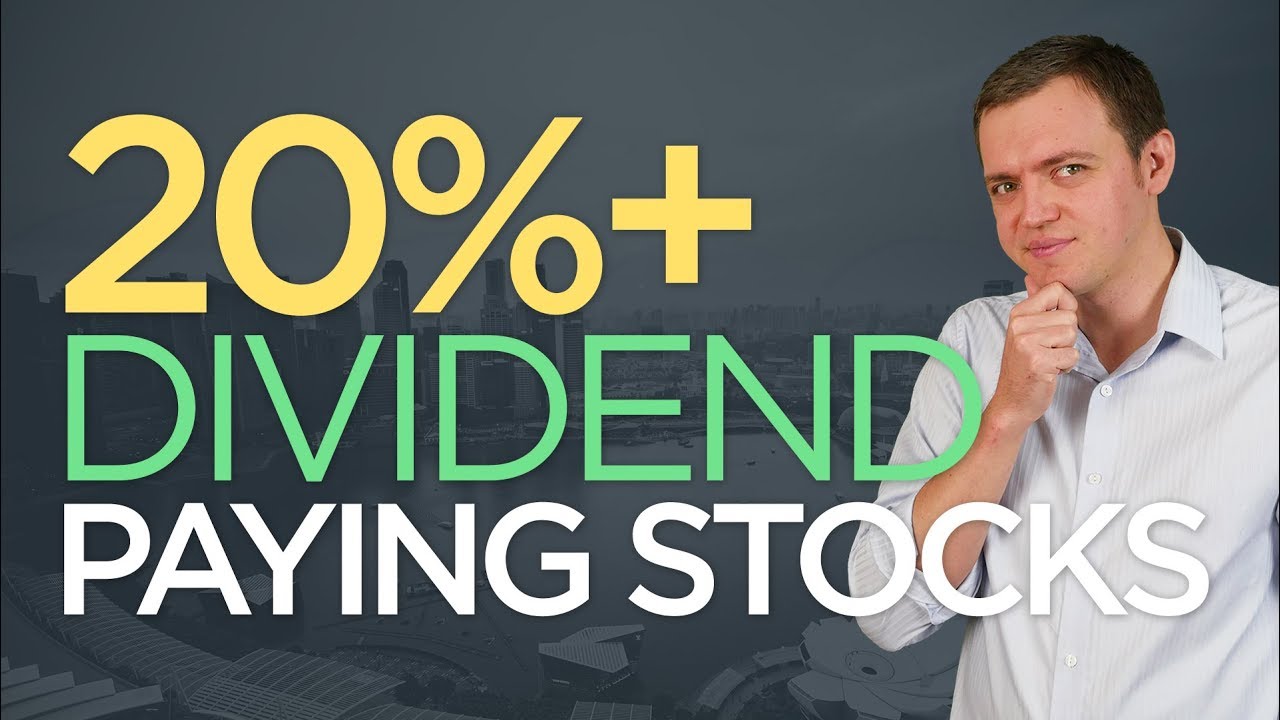Today, we’re going to take a look at high paying dividend stocks, that pay you over 20% dividends and the risks that go along with that.
What are dividends?
A dividend is a sum of money paid periodically (usually quarterly) by a company to its shareholders from its profits.
Not every company pays dividends. But in simple terms, if you own shares of a company that’s a dividend paying company, you get a sum of money that’s paid to you in form of dividends, into your trading account. So every three months they pay you money simply for holding on to those shares.
You get paid based on the number of shares you own. The more shares you have, the more money you get.
This is how some people make a fortune in the stock market. If you have a lot of money and you have some really good dividend paying stocks, then you can make a fairly decent living from the dividends.
However, there are some issues that go along with this. People get attracted to high-paying dividend stocks. But remember, in the market, you make money from two different ways.
You make money from the dividend itself, the payout. But also you make money through appreciation, as that stock heads up. And if the stock goes down, you lose money.
High paying dividend stocks are not necessarily the only thing that you want, because usually the more dividends that a company pays out on a percentage basis, the more likely it is to continue to depreciate. And in this case, it would take quite a bit of time to get back what you lost with dividend payments.
In general, if you’re investing in dividends, look for the popular companies, the stable companies that have been paying out consistently time and time again. Like Wal-Mart, Verizon or AT&T.
In this video I want to share with you some more speculative stocks, they still pay out dividends, but you should be aware of them, and most people should stay away from them because they are very speculative and very risky.
Usually these companies offer very high dividends, and it sounds pretty good, but in reality, they have a very low share price, which means they’re only paying a few cents per year in dividends, even though it’s a big percentage relative to the share price.
You want to be careful because they can seem attractive when you look at the dividend rates, but remember, depreciation matters quite a bit as well. Usually, the dividend is not stable, and you don’t know when they’re going to stop paying it. You don’t know when they will reduce it or increase it. Because remember, it comes down to how much money they have on that balance sheet, and if they don’t have the capital to pay you, you may not get paid.
So in conclusion, compared to other vehicles that you could put your money in, most high-paying dividend companies, is not something I would want to go for, simply because the stock appreciation is not usually there, and dividends are usually extremely cheap.
Posted at: http://tradersfly.com/2017/10/huge-dividend-stocks/
★ REGISTER FOR A FREE LIVE CLASS ★
http://bit.ly/marketevents
★ GETTING STARTED RESOURCE FOR TRADERS ★
http://bit.ly/startstocksnow
* Please note: some of the items listed below could and may be affiliate links **
* Trading Software / Tools *
Scottrade: http://bit.ly/getscott
SureTrader http://bit.ly/getsuretrader
TC2000: http://bit.ly/gettc2000
TradeKing: http://bit.ly/gettradeking
TradeStation: http://bit.ly/getstation
★ SHARE THIS VIDEO ★
★ SUBSCRIBE TO MY YOUTUBE: ★
http://bit.ly/addtradersfly
★ ABOUT TRADERSFLY ★
TradersFly is a place where I enjoy sharing my knowledge and experience about the stock market, trading, and investing.
Stock trading can be a brutal industry especially if you are new. Watch my free educational training videos to avoid making large mistakes and to just continue to get better.
Stock trading and investing is a long journey – it doesn’t happen overnight. If you are interested to share some insight or contribute to the community we’d love to have you subscribe and join us!
FREE 15 DAY TRIAL TO THE CRITICAL CHARTS
– http://bit.ly/charts15
GET THE NEWSLETTER
– http://bit.ly/stocknewsletter
STOCK TRADING COURSES:
– http://tradersfly.com/courses/
STOCK TRADING BOOKS:
– http://tradersfly.com/books/
WEBSITES:
– http://rise2learn.com
– http://criticalcharts.com
– http://tradersfly.com
– http://backstageincome.com
– http://sashaevdakov.com
SOCIAL MEDIA:
– http://twitter.com/criticalcharts/
– http://facebook.com/criticalcharts/
MY YOUTUBE CHANNELS:
– TradersFly: http://bit.ly/tradersfly
– BackstageIncome: http://bit.ly/backstageincome
source


















Hi again Sasha ! My question for you is how can one find out what time frame a company pays out it's dividens ? Monthly, quarterly, or yearly ?
Very clear and well said.
In retrospect, MSB actually would have been a great buy, but all are good illustrations of the great risks involved with such situations.
Bpt went from 21 to 32 and still pays huge dividend, hope people bought that one
2 things on the VOC Example. Also, this doesn't mean it is good or will ever be good again.
On the last Payment, it went back up on the Dividends, more than doubling. Add to that the small upward swing in Stock Price.
SOMETHING, and it may be short lived/flash in the pan, injected money/value into that Company. In theory, if they do the right things they can start to climb a bit and become stable.
Now, that said… I wouldn't hold my breath on it. But VOC was showing a sign of life there, while the others were all DOA.
NOTE: So I noticed this Video was a year old, and that got me curious on VOC. It's at 4.48 a Share right now, they haven't missed a Dividend either. It's still not really stable, but in 2018 they paid 0.11, 0.18, 0.20 and 0.22 for each Quarter (10/29).
So there may yet be some optimism for them.
Some companies that pay high dividends also pay them consistently. In the short term if you trying to get some quick capital those are great. Then you get out. Period.
Such a poor representation of huge dividend paying stocks. Looks like you cherry-picked some of the worst examples just to prove your point. Dividend stocks, like all stocks are about research and your personal investing strategy. There are several 20% dividend yield stocks that have 5 yr growth patterns of 50% or more and are strong, stable companies or etf's. There are others that have traded within the same price range for years with very little overall fluctuation but still strong, stable companies. Like you said, growth doesn't happen because you get it through the dividend. But choosing 15-20% return on a a risk of your principle fluctuating 5% or so is still a better return than sticking it in a 1% savings account.
good advice
Never heard of bpt do you live under a rock ?
WOW what a great video! Thanks so much! Just got the answers I needed after watching like 50 videos !
What do u think of ftr
What is your opinion of REIT`S ? I would like to invest in real estate passively. I don`t want to be a landlord. I have been researching some. Some of the ones that invest in single family homes , such as RVEN, INVH , and SFR are losing money. Do you know why ?? What is your opinion ?? Thanks.
i normally get a list of the payout dates (xdividend dates) invest the day before and cash out the day after
Can a company cancel paying you a dividend when it's depreciating and you already own a stock? And when it begins to appreciate again it won't pay you a dividend?
How long of a period do you have to see a stock appreciating to know it's a good stock to invest in?
Do any mutual funds or index funds pay dividends?
Another Great Video
Hey Shasha. How long do you have to hold stock to get dividends? Thank you!
Hi Sasha, What time frame do u use in Elliot wave theory? thanks.
excellent video!